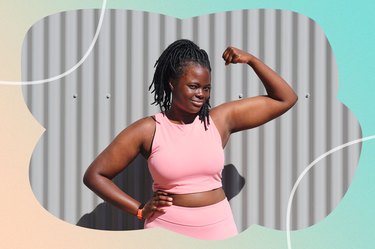
If you've ever felt discomfort surrounding your body image, you're not alone. Claire Siegel, RD has been there. Siegel was a chronic dieter who spent years restricting calories and trying fad diets in order to lose weight.
"I was so desperate to 'solve my weight problem' that I became a registered dietitian in the process," Siegel says. "Eventually, I hit my goal weight — and I was miserable. Oh, and all the food rules and restriction? They'd wrecked my metabolism, mental health and social life, too."
Video of the Day
Video of the Day
After realizing that weight alone doesn't determine health or happiness, Siegel founded Flourish, a nutrition and body image support platform made to help people let go of food and body drama and build healthy habits.
"The way a person thinks and talks about their body has a demonstrated effect on their psychological wellbeing in terms of their risk for depression, anxiety and disordered eating," Siegel says. "The idea of healthy body image isn't to have happy body thoughts all the time — that's just not realistic. But progress can look like choosing a positive behavior in spite of a negative body thought, or replacing that thought with something more neutral."
Through the Flourish app, Siegel is using tech as a tool for good and helping people connect to a healthier mindset through virtual coaching and more. To help you on your journey, Total by Verizon offers no-contract wireless plans and the network America relies on so you can have support right at your fingertips.
Keep reading for Siegel's tips for shifting your body-image perspective to a positive one, including how to use social media mindfully.
1. Start Your Journey Today
"Don't put off being kind to yourself until you reach some weight or size milestone," Siegel says. After all, the number on the scale alone doesn't dictate happiness: In an August 2014 PLOS One study of nearly 2,000 adults with overweight or obesity, people who lost weight were more likely to feel depressed than people who gained or had a stable weight.
While weight loss of course doesn't always result in poor mental-health outcomes — and can be a part of your health goals overall — there's no guaranteed moment you'll suddenly feel differently about your body, so there's no better time to start your body-image journey than now.
2. Create a Self-Compassion Practice
After you've committed to building up your self-image, you should take a look at how you talk to yourself. "Train your brain to recognize and redirect negative self-talk," Siegel says. "Ask yourself, 'What would I say to a friend who was talking about themselves this way?'"
Self-compassion has been linked with positive mental health and wellbeing, according to a July 2018 analysis in Self and Identity, which notes that more is being discovered about the benefits of self-compassion not only regarding body image, but also health, motivation, interpersonal relationships and physiological functioning.
With that in mind, the next time you notice yourself engaging in negative self-talk, make a conscious effort to switch to encouragement instead. Over time, you may find that becoming your norm.
Social media can be a trigger when it comes to self-image, no matter your weight. In a March 2021 International Journal of Environmental Research and Public Health study, researchers found no significant association between body mass index and the frequency of comparing one's physical appearance to people they followed on social media. The more subjects compared themselves to social media images, the more their body dissatisfaction and drive for thinness increased.
"In terms of mindfully navigating social media, I always go back to auditing your feeds and making sure they serve you," Siegel says. In other words, don't be afraid to mute or unfollow.
"I'd also say that if you're consuming educational health content, make sure the creator is knowledgeable — credentialed is even better. Check for citations and every so often, dig into the research yourself."
In addition to following experts, Siegel also recommends focusing on a diverse representation of beauty, so challenge yourself to branch out if you usually only follow creators with one type of look or aesthetic.
4. Sustain Healthy Habits
Once you start incorporating tips for improving your body image, how do you keep yourself accountable for continuing the journey? The first step is noticing black-and-white thought patterns, like eating one "bad food" or missing one workout leading to harsh self-criticism or stopping entirely.
"Perhaps counterintuitively, allowing yourself flexibility can keep you on track toward your bigger-picture goals," Siegel says.
She also recommends working with a partner to help you be accountable for your habits. "Regular check-ins on progress toward your goals — qualitative or quantitative — is both a powerful motivator and strong predictor of goal achievement," Siegel says.
While shifting ingrained patterns isn't easy, leaning into a support system and focusing on the end game can help. Here's to a future with less negative self-talk, and more kindness.
If being economical is a habit you'd like to build, discover new ways to cut costs, like through an affordable wireless plan. Click here to learn more about Total by Verizon, a new, no-contract carrier with plans starting at $30 per month.
- PLOS One: "Psychological Changes following Weight Loss in Overweight and Obese Adults: A Prospective Cohort Study"
- Self and Identity: "New frontiers in understanding the benefits of self-compassion"
- International Journal of Environmental Research and Public Health: "Social Media Use and Body Image Disorders: Association between Frequency of Comparing One’s Own Physical Appearance to That of People Being Followed on Social Media and Body Dissatisfaction and Drive for Thinness"
- Circulation: "Impact of Healthy Lifestyle Factors on Life Expectancies in the US Population"
Was this article helpful?
150 Characters Max
0/150
Thank you for sharing!
Thank you for your feedback!
Is this an emergency? If you are experiencing serious medical symptoms, please see the National Library of Medicine’s list of signs you need emergency medical attention or call 911.